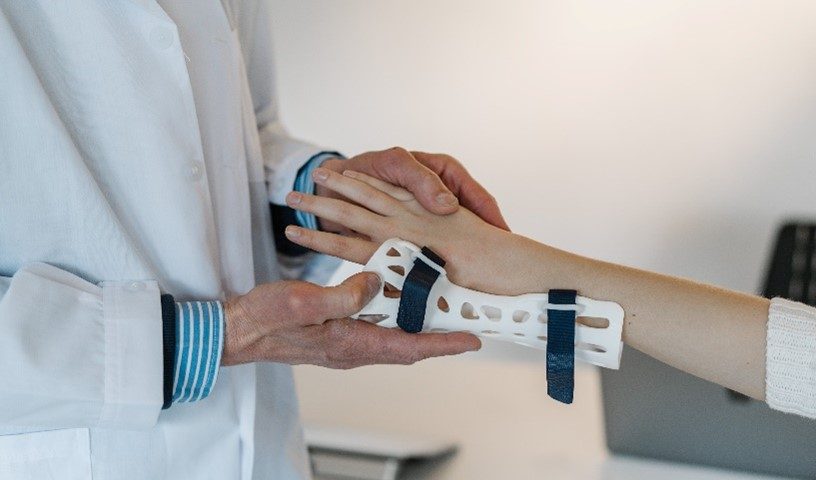- Hyderally & Associates P.C | Employment Lawyers NJ, NY
- (973) 509-8500
- tyh@employmentlit.com
Employees with Medical Issues Have an Easier Road to Navigate In the New Jersey Work World

New Year, New Minimum Wage in New Jersey
December 20, 2022
NJIT Police Officer Can Use Special Arbitration to Appeal Termination
December 26, 2022By: Ty Hyderally, Esq. and Francine Foner, Esq.
When does an employee’s disability prevent that employee from being able to perform their essential job functions? That was the question which the New Jersey District Court recently considered when it denied the motion of Bergen New Bridge Medical Center (“New Bridge”) for summary judgment on a claim for disability discrimination by its former employee, Federaddis Bayye (“Bayye”). Bayye v. Bergen New Bridge Med. Ctr., 2022 U.S. Dist. LEXIS 220818, 2022 WL 17486345
Bayye was working for New Bridge as a Medical Health Assistant (“MHA”) when she injured her right wrist at work on January 15, 2012. Bayye then returned to work in February 2012 and worked for New Bridge under a “light duty” restriction which limited the amount that she could lift, until January 2018. Bayye had no issue performing her MHA functions with the lifting restriction during this time period.
In January 2018, Bayye was asked to meet with New Bridge’s human resources representatives, during which meeting it was agreed that Bayye had reached her maximum medical improvement and Bayye could return to work without restrictions. Bayye then worked as an MHA from January 2018 to March 2018, without restriction. However, at the end of March 2018, New Bridge received a medical note from Bayye’s treating physician prescribing her modified/light duty with “permanent restrictions of no lifting over 20 pounds.”
New Bridge decided that this permanent lifting restriction prevented Bayye from performing the essential functions of her MHA position, even though she had been successfully performing her position with this restriction for approximately six years. New Bridge suspended Bayye and proposed alternate positions, but Bayye was not qualified or suited for any of the proposed alternate jobs. On June 22, 2018, Bayye provided New Bridge with another note from her doctor, this time clearing her to return to work without any restrictions. New Bridge then required that Bayye undergo an independent Functional Capacity Examination (FCE), which would evaluate Bayye’s capacity to perform work activities. The results of the FCE found that Bayye could perform “light” work and occasionally lift up to 20 pounds with “certain precautions related to right upper extremity activities”. Id. at *6-7. Based on the results of the FCE, New Bridge concluded that Bayye could not meet the MHA position’s physical requirements and terminated Bayye on August 7, 2018.
On October 29, 2019, Bayye filed a complaint in the New Jersey District Court against New Bridge alleging, inter alia, disability discrimination under the New Jersey Law Against Discrimination and the Americans with Disabilities Act. New Bridge moved for summary judgment dismissing Bayye’s claims. The Court observed that the issue that needed to be resolved to determine whether Bayye’s disability discrimination claims should be dismissed was whether there was any genuine issue of material fact as to whether Bayye could perform the essential functions of her MHA job. The Court further broke this inquiry down into two sub-questions: (1) what the MHA’s essential job functions are, and (2) whether Bayye could perform them. The Court found that there were genuine factual disputes surrounding both of these questions, and denied New Bridge’s motion for summary judgment dismissing Bayye’s claim of disability discrimination.
First, the Court opined that the record was unclear as to what Bayye’s MHA job functions were. In concluding that summary judgment should be denied as to that question, the Court observed that Bayye had been performing her MHA duties for several years, despite her medical restrictions. In addition, there was nothing in the record, or any allegation, that Bayye posed a safety hazard to any patients because of her lifting restriction. Id. at *17.
Second, the Court held that there was an issue of fact as to whether Bayye could perform the essential functions of an MHA. In denying summary judgment as to that question, the Court considered that the weight to be given to Bayye’s physician’s conflicting return to duty notes was something a jury should decide. In addition, as it had with the first inquiry, the Court found it significant that Bayye had been performing her MHA duties for several years, despite her medical restrictions. As the Court acknowledged, “[c]ourts have denied summary judgment where an employee whose essential duties included lifting could actually perform those duties despite medical restrictions.” (Citations omitted). Id. at *20.
The take away from this decision is that just because a job description may contain minimum physical requirements, the inquiry does not end there. Rather, an employer must consider what job duties are actually essential, not just what is in the written job description, as well as whether an employee has actually been performing his or her job duties with physical restrictions. This decision is a victory for New Jersey employees with disabilities who can perform their job duties, despite physical restrictions.
En nuestra firma hablamos español. This blog is for informational purposes only. It does not constitute legal advice and may not reasonably be relied upon as such. If you face a legal issue, you should consult a qualified attorney for independent legal advice with regard to your particular set of facts. This blog may constitute attorney advertising. This blog is not intended to communicate with anyone in a state or other jurisdiction where such a blog may fail to comply with all laws and ethical rules of that state of jurisdiction.


